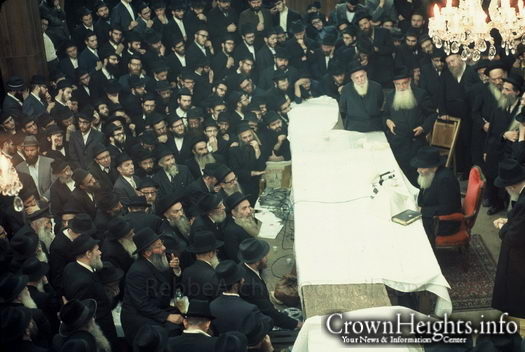
Weekly Story: Keep Moving Forward
Today, we are beginning the 68th year of the Rebbe’s nesius (leadership). Sixty-eight is the numerical value of the word Chaim (life). So while every year the farbrengen in honor of Yud Shevat, is a momentous occasion, this year it is especially so, we have to bring life and vitality into our connection to the Rebbe.
by Rabbi Sholom D. Avtzon
Coming from a Yud Shevat farbrengen, I chose to give over some of the points that Rabbi Berel Mockin sheyiche brought out in the farbrengen, (and the story that I had prepared will be used for some other week).
Today, we are beginning the 68th year of the Rebbe’s nesius (leadership). Sixty-eight is the numerical value of the word Chaim (life). So while every year the farbrengen in honor of Yud Shevat, is a momentous occasion, this year it is especially so, we have to bring life and vitality into our connection to the Rebbe.
When Moshe Rabeinu saw the burning bush he was taken by the phenomenon, and the posuk states that Moshe said “Uhsoorah nuh…” [I will go from where I am standing and come closer to it and see and observe it]. There is an important lesson to learn from these words, if one wants to gain clarity and come closer to something, the prerequisite is, they move away from their present state of mind. As long as you refuse to move and change, you cannot become closer and connected to that.
If we desire to strengthen our hiskashrus to the Rebbe, and come closer etc., the Torah is informing us that the first thing is, to be ready and actually leave your comfort zone. A person must realize that their present state of mind, and thet the state that is being demanded might not be and most probably is not, the same as before. I must leave my present state and accept the challenges of whatever uncertainty the future state will be demanding from me.
This act of movement is critical, as movement in itself is the definition of life. A live person moves, whereas one who has departed, can no longer move. So when you show that you are willing to move forward, you are also proclaiming you are alive and living. So live with the Rebbe by learning his teachings and fulfilling his directives.
However, each and every individual knows their true level and sometimes the truth is that my actions may not be proper and therefore the person feels and believes that they are not worthy of representing him etc.
On this point, one does not have to look further than the maamar of Basi L’gani, where the Rebbe addresses this very point. In fact it is one of the focal points of the entire maamar. He states; a person knows that they possess some folly (shi’tus dikelipa) and therefore they may feel, how can they come close to Hashem. So he explains in the maamar, that the entire purpose of the descent of one’s neshoma into this world is to battle with and overcome this folly that is in you and in the world around you. When one succeeds, they are thereby coming closer to Hashem, even closer than before the neshoma descended initially.
This is in essence the meaning of Hashem desired to have a resting place for Himself in this LOWER world. If you feel that you are “low” so that is where Hashem desires to shine and become connected with.
***
Another point that was discussed; a leader of the Jewish nation has various titles, Rebbe, Nasi (leader), Melech (king) Raya Mehemna (faithful shepherd) and others. When the Rambam (hilchos melachim 3:6) describes a king, he uses the metaphor of a heart; “that the king is the heart of the people”. The function of a heart is to pump blood i.e. vitality to all the limbs equally. So although each limb has its unique function and there seemingly are more vital limbs than others etc., never-the-less, the limb pumps the blood equally to all of them.
This informs us, that although the truth may be that others are more qualified than you and therefore you may feel that your contribution and participation is not important or significant enough, we see that to the heart -the king-, all of the limbs (people), are equally important. In other word, the Rebbe wants and needs that each one of us completes our unique mission. And the major victory is accomplished though the successful execution of numerous “minor” details. Which shows that they weren’t so minor, and neither are your contributions in hafatzas hayahadus v’haChassidus.
Another important lesson to derive from the heart’s function, the heart pumps blood to all the limbs and then the limbs give it back to the heart to renew the cycle again.
This tells us, that although it is definitely so, that the strength one has comes from their heart, and by us, our success in the mission given to us by the Rebbe, is the brocha from the Rebbe. But one has to realize that in order that their success remains continuous, they have to give back to the Rebbe and then the Rebbe gives it back to you.
Yes the Rebbe blesses every Jew, even if they may not reciprocate, but it is much geshmaker if we earn it through our avodah as well.
***
One final point, we should approach each person with our heart and not with our intellect. As the expression goes; “In the heart, there is always room for one more.” Each one of us must turn our houses into a Chabad House, and invite our former classmates and friends, whose Ohr Hachassidus, may not be as bright as it used to be, so that can return to its former self.
May we all fulfill our Shlichus wherever we are, and fulfill Hashem’s desire to transform the world into a mishkan (tabernacle) where His essence can be revealed, and thereby meriting the revelation of Moshiach Tzidkeinu, may it be speedily in our days.
Rabbi Avtzon is a veteran mechanech and author of numerous books about the Rebbeim and their chassidim. He is available to farbreng in your community and can be contacted at avtzonbooks@gmail.com













